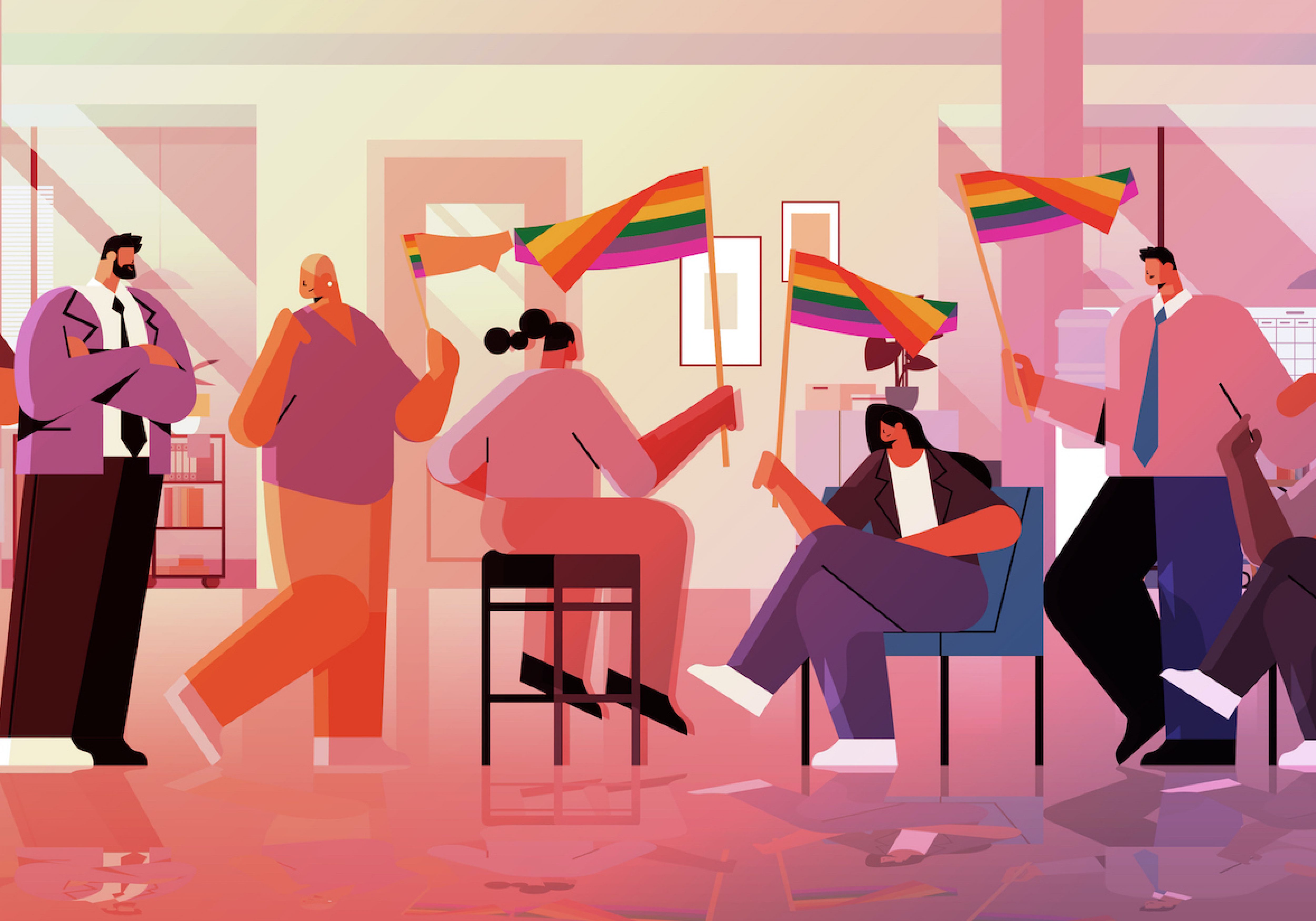Despite more companies pushing their commitment to diversity and inclusion and encouraging individuals to be their authentic selves at work, most graduates and new recruits still fear revealing their true identities to their managers and bosses.
It’s no secret that LGBTQ+ graduates and professionals often return to the closet when they start a new job, despite intentions to work with pride. In fact, the latest study from myGwork, the business community for LGBTQ+ professionals, revealed that seven out of 10 graduates and students in the UK and US would return to the closet if their colleagues were not allies or supportive of them being out at work, even though 83% have been out at university and had intentions of #WorkingWithPride.
Dangers of discrimination and having to hide
Like many other recent studies, myGwork’s latest statistics highlighted that discrimination is still rife for young LGBTQ+ professionals and graduates. Six out of 10 members of Gen Z, for example, said that they have been discriminated against in their place of work or study. However, the study also revealed that more than two thirds of university students and graduates would leave their job if they couldn’t be authentic and out at work.
Having to hide aspects of your identity can take a huge toll on your mental health, which leads to a loss of focus, productivity and interest in your role. Our own experiences of discrimination early on in our careers, for example, meant that we both had to return to the closet each time we started a new job. They also led us to set up myGwork, a global business platform for LGBTQ+ professionals that aims to help the community find jobs with inclusive employers, as well as providing employers with guidance on how to attract and retain diverse LGBTQ+ talent.
Today’s younger talent, especially Gen Z, cares much more about diversity and inclusion. It’s no longer enough for an organisation to say that it’s serious about having an inclusive workplace because today’s talent wants to see it in action. With so many companies being called out recently for performative allyship or rainbow washing, younger professionals want solid proof that the companies they are planning to join are truly progressive and inclusive, and live up to their diversity and inclusion statements.
So, how can you find out just how committed a company is to LGBTQ+ inclusion and allyship? Here are eight key signs to be on the look out for.
1. Inclusive policies
It’s vital to find out whether companies have policies which show that their leaders really do care about employee wellbeing by providing a work environment not only where staff can enjoy what they do, but also where the pay, benefits and culture promote a sense of belonging. myGwork’s survey found that 26% of LGBTQ+ Gen Zers want to see LGBTQ+ inclusive policies.
At the most basic level, you should look for policies that use gender-neutral language, alongside inclusive policies which are not gender-biased. For example, ensure that parental leave policy is available for all genders. This includes parental leave for same-sex partners, alongside additional healthcare benefits for staff who may be transitioning.
2. Zero-tolerance discrimination policy
Check if a prospective employer has a zero-tolerance discrimination policy. This can provide reassurance that you will never have to return to the closet. LGBTQ+ inclusive companies will go out of their way to highlight zero-tolerance discrimination policies in their onboarding process, employee handbook and contract, along with the serious consequences for non-compliance.
3. Visible LGBTQ+ role models and allies
Another sign to look out for is visible LGBTQ+ role models.Our survey showed that 22% of students/graduates seek visible role models and allies who speak openly about LGBTQ+ inclusion. Find out whether the senior leaders in the company you are being interviewed by go that extra mile to achieve equality and use their platform to amplify the voices of the LGBTQ+ communities by taking part in inclusion conversations at external forums.
4. Observe diversity days that are important to the LGBTQ+ community
Our survey revealed that 21% of Gen Zers look at what organisations are doing to mark diversity days/periods, such as Pride Month or Trans Awareness Week, and if they support any LGBTQ+ causes. Does the company that you are planning to join demonstrate real allegiance to the community by going above and beyond supporting the annual Pride Month or LGBTQ+ History Month? Companies that are serious about LGBTQ+ inclusion also tend to provide ongoing support to LGBTQ+ causes and charities. So ask about that in your interview.
5. Visible signs of LGBTQ+ allyship
About 16% of Gen Zers told us they expect to see year-round visible signs of LGBTQ+ allyship in the offices of inclusive companies. Companies that truly care about attracting and retaining LGBTQ+ hires will have visible signs of LGBTQ+ allyship, such as staff members wearing rainbow lanyards and pronouns on badges and signatures. Having unisex toilets is another tell-tale sign of an inclusive workplace.
6. Active LGBTQ+ employee resource groups
Active employee resource groups (ERGs) or networks that emphasise intersectionality and supports all marginalised groups – such as the non-binary, gender fluid and asexual communities, as well as queer people of colour and other subsets within the LGBTQ+ community, like the Black trans communities – are also a must. Around 12% of LGBTQ+ students look for this, according to our survey. Another important sign is whether the ERG is supported by senior LGBTQ+ allies across the business – the higher up the ladder they are, the better.
7. Adequate diversity and LGBTQ+ inclusion training
Another good sign to look out for is adequate LGBTQ+ training that backs up a company’s DE&I policies. Training should go beyond a basic education on diversity and different identities within the LGBTQ+ umbrella. It should provide practical advice on how to be mindful of unconscious biases and not make assumptions about colleagues, their partners and family circumstances.
Training should also provide guidance on how to call out inappropriate and harmful behaviour and language, harassment, slurs and stereotypes, as well as offer advice on how to avoid misgendering, deadnaming and so on. Do policies encourage calling out bad/inappropriate behaviour/harassment?
8. Ongoing outreach programmes to engage with the LGBTQ+ community
Finally, does a prospective employer go out of its way to recruit LGBTQ+ talent by engaging with diverse job boards and recruitment events through ongoing outreach programmes? Job postings on LGBTQ+ recruitment/networking platforms or a booth at careers events like #WorkFair are good signs that a company is working hard to attract LGBTQ+ talent.
Involvement in LGBTQ+ conferences like #WorkPride should also provide you that added reassurance that the company you are planning to join does go that extra mile to provide an inclusive workplace where you can be your authentic self, without fearing a return to the closet.








